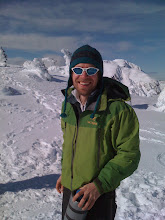 Here's the story I wrote for today on the boreal forest conference at UAF and remarks by Terry Chapin, an ecology prof at the Institute of Arctic Biology and well-respected researcher.
Here's the story I wrote for today on the boreal forest conference at UAF and remarks by Terry Chapin, an ecology prof at the Institute of Arctic Biology and well-respected researcher.Global climate change is driving an increase in wildfires, enabling widespread insect outbreaks, and otherwise threatening Alaska’s forests, a University of Alaska Fairbanks professor said Wednesday at the start of a four-day international conference on boreal forests.
Terry Chapin, who teaches ecology at the Institute of Arctic Biology and who is the lead investigator at a university-sponsored research station, said in his keynote address that it was critical to consider ways to adapt to changes associated with the warming and to look for ways to limit those changes by reducing greenhouse gas emissions.
Forest disturbances — namely wildfires, insects and disease — are natural and important, he said. But when that set of natural disturbances changes radically, plants and animals may not adapt well to the changes and communities may not want those changes or be prepared for them.
Temperatures in Alaska have increased, particularly in the last few decades, and are expected to keep going up, Chapin said.
The higher temperatures themselves are likely to stress certain tree species, including white spruce, he said. The warming has also contributed to an increase in wildfires and allowed spruce beetles to reproduce faster and cause greater damage.
“It basically changes the rules,” he said of the effect on beetles and spruce.
Chapin said it was likely there would be a “resorting” of vegetation as forests recover from fires in a warmer and drier climate. Instead of returning immediately to black spruce, an area may grow back with birch and aspen, which could reduce the risk of future fires and provide feed for moose and other animals.
Ultimately, he said, land managers could try to shape future forests to reduce the negative effects of wildfires.
Buck Sharpton, the university’s vice chancellor for research at UAF, told conference attendees that in many ways, climate change seems to provide opportunities as well as challenges. But with regard to the boreal forest, there seem to be only challenges — wildfires, insects and diseases.
“If there’s a silver lining in this cloud, I would certainly like to hear it,” he said.
About 75 people attended the conference, including scientists from around the United States and from Canada, Russia and Estonia. Previous conferences have focused on ecological consequences of disturbances and major disturbances such as fires and logging. This year’s conference is focused on the impacts of climate change on boreal forest disturbances.
Other presenters on Wednesday discussed a puzzling decline in overall vegetation in eastern Interior Alaska, the apparent link between climate warming and the increase in a number of forest insects, and the connection between spring snow cover and the death of yellow cedar trees in Southeast.

No comments:
Post a Comment